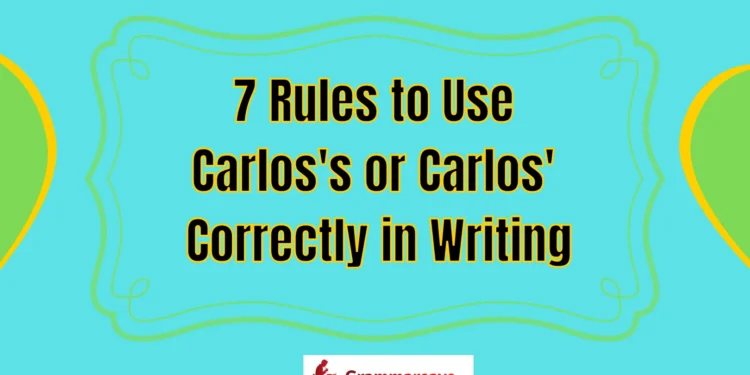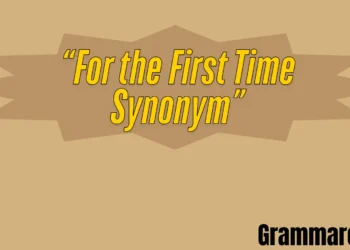Prior to the examination of contemporary practices, a grasp of the origin of this controversial possessive problem is a must. The development of possessive forms in English has been ongoing for hundreds of years, going through Latin, Old English, and pronunciation and punctuation norms changes. Every period brought difficulty in spelling and punctuation systems, and nearly every generation of English language users had its own standards for using the possessive forms, which explains the enigmatic Carlos’s or Carlos’ names, among others of the same kind.
Rules from the Past vs. Here and Now
The classical way
From the earliest days, the procedure to form possessives was clear: for single number nouns—to be observed that whenever they ended up—the end was the addition of ‘s. After several cases of names that end in s, the ‘s version of the name is theirs.
New ways
Though written and spoken English came a long way, new conventions emerged as the language evolved. The main change in modern usage is due to the English language becoming simpler, more consistent, standard, and more predictable, especially in words that end in s.
Arguments in Favor of “Carlos’s”
Conformity with Standard Grammar
The way Carlos’s works follows the simple rule: add s after an already-singular name. Doing so keeps meaning clear and grammar neat.
Examples:
- Carlos’s presentation was compelling.
- I left my umbrella at Carlos’s house.
- Carlos’s ambition is admirable.
Reflecting Natural Pronunciation
Spoken English often adds the /əz/ sound after such names. Since we articulate it as “Car-los-ez,” many style authorities argue it should be written accordingly—with the full ’s.
The Case for “Carlos’”
Aesthetics and Visual Simplicity
Some writers and editors advocate for Carlos’ because it avoids a visual cluster of “s” characters. This form is particularly common in journalistic or headline writing.
Examples:
- We reviewed Carlos’ latest design.
- The announcement came from Carlos’ department.
- Carlos’ influence is widely acknowledged.
A Traditional Simplicity
Though less aligned with spoken patterns, this style has historical backing in print media and is often employed for stylistic brevity.
Diverging Style Guide Positions
Guide-by-Guide Summary:
- Chicago Manual of Style: Strongly favors Carlos’s.
- Associated Press (AP): Endorses Carlos’ to reduce clutter in print.
- APA Style: Aligns with traditional grammar—recommends Carlos’s.
- MLA Style: Generally prefers Carlos’s, though Carlos’ is acceptable in some instances.
Practical Applications by Writing Context

Business Correspondence
Clear, consistent writing builds trust. Stick to your organizations style guide and use it the same way in every note, report, or email.
Academic Writing
Many schools now prefer the full possessive-Carlosys-to signal careful scholarship. Check APA or MLA rules to stay correct.
Special Considerations and Exceptions
Historical and Religious Figures
Tradition often guides usage here. Names like Jesus and Moses are commonly written without the extra “s.”
- Correct: Jesus’ parables, Moses’ leadership, Socrates’ dialogues
Contemporary Usage
Modern names, unless otherwise specified, typically follow the standard possessive rule (Carlos’s), though flexibility remains depending on tone and platform.
How to Decide Which Form to Use
Your choice should be informed by multiple factors:
- Target audience
- Formality of the document
- Style guide expectations
- Visual preferences
- Pronunciation fidelity
Use-Case Scenarios
Business Writing
Examples for clarity:
- Carlos’s report is complete.
- Please forward the email to Carlos’s address.
Academic Documentation
Depending on citation style:
- Carlos’s (2022) findings suggest a trend.
- The result aligns with Carlos’ interpretation.
Creative Content
In stories and other creative writing, readability and tone usually sit at the top of the priority list. Pick the version that matches your prose rhythm and stick with it all the way through.
Professional Guidance from Language Experts
Respected grammarians and editors often recommend weighing the following:
- Ease of reading
- Consistency within the piece
- Reader expectations
- Organizational standards
The Role of the Final “S”
Though seemingly minor, the extra “s” can influence:
- Flow of the sentence
- Perceived formality
- Pronunciation when read aloud
- Typographic appeal
Impact of Digital Writing and Modern Tools
Grammar Technology Integration
Software like Microsoft Word, Grammarly, and Google Docs now accepts both forms without marking them wrong. However, most grammar software will suggest Carlos’s as the default based on rule-based logic.
Regional Norms in English Usage
United States
Predominantly favors Carlos’s in professional and academic contexts.
United Kingdom & Ireland
More tolerant of Carlos’, especially in informal or journalistic settings.
Canada & Australia
Canada mostly leans toward U.S. practice, while Australia blends British and American choices according to the situation.
Best Practices by Context
For Formal Documents
- Follow institutional guidelines closely
- Choose a single form and maintain consistency
- Factor in audience expectations
For Informal or Personal Writing
- Select the form that reads most naturally
- Prioritize clarity and tone over strict formality
Misconceptions and Complex Cases
Joint Possession
- Carlos and Anna’s home → shared ownership
- Carlos’s and Anna’s reports → separate possessions
Business and Brand Names
Brand possessives should match the company’s styling:
- Starbucks’ latest release
- Walgreens’ policies
Social Media and Character-Limited Platforms
Platform-Driven Adaptations
With constraints like Twitter’s character count, many opt for Carlos’ for brevity. Conversely, platforms like Instagram and LinkedIn allow for more formality.
Possessives in Global Communication
Cross-Cultural Writing
When addressing an international audience:
- Consider regional style preferences
Educational Approaches for Teaching This Rule
Instructional Strategies
Doubtless, start with regular rules (add ‘s to singular nouns), then get through with exceptions and style guide variances step by step. Use memory aids like:
- “If it’s someone’s, it gets an ’s”
- “When in doubt, speak it out”
Digital Grammar Tools and Recommendations
What Software Suggests
- Grammarly: Defaults to Carlos’s
- Microsoft Word: Accepts both without flags
- Google Docs: Offers neutrality, with occasional context-based prompts
Regional Trends: A Deeper Dive
- U.S.: Carlos’s preferred across most platforms
- U.K.: Carlos’ more common, particularly in newspapers
- Australia: Mixed usage
- Singapore: Tends toward American usage
- New Zealand: Core British influences prevail
Sector-Specific Writing: Legal, Medical, and Technical

Legal Contexts
Formal documents often prefer the fully formed possessive.
- “Carlos’s duties outlined herein…”
- “Carlos’ estate will…”
Medical Records
Precise and consistent usage is expected:
- “Carlos’s symptoms worsened…”
- “Carlos’s prior diagnoses…”
Language in Transition: Trends and Predictions
Style Evolution
Language is dynamic. Current trends show:
- Growing acceptance of both forms
- Increased reliance on context
- Influence of mobile devices and online media
Guidelines for Practical Implementation
How to Choose Intelligently
Follow this decision path:
- Audience understanding
- Document type and length
- Format: digital or print
- Relevant style guide
Looking Ahead: What’s Next for Possessives?
Language Forecast
Expect continued movement toward:
- Simplification of rules
- Flexible, reader-first approaches
- Platform-specific variations
- Blending of regional norms into “Global English”
Final Takeaways for Writers and Editors
To ensure effective and polished communication:
- Be consistent throughout your text
- Document your style decisions internally
- Educate your team or students on the options
- Update practices based on style guide changes
FAQs
Q1. Which is more professional in a press release?
AP Style (Carlos’) is standard for PR/marketing.
Q2. What’s the trend in modern usage?
Carlos’s is gaining popularity for consistency with other possessives.
Q3. What do major publishers prefer?
Books (Chicago): Carlos’s
Newspapers (AP): Carlos’
Q4. Is “Carlos’” acceptable in legal documents?
Yes, but Carlos’s is often clearer for legal precision.
Q5. What’s the rule for singular possessive names ending in “s”?
Traditional Rule: Add s (Carlos’s).
AP Style Exception: Only an apostrophe (Carlos’).
Q6. Does pronunciation affect the choice?
Yes—if you pronounce the extra “s” (e.g., “Carlos-ez car”), Carlos’s is more accurate.
In Summary
Both Carloss and Carlos are acceptable. The choice to be made perhaps depends on the context, audience, platform, and the style manual you adhere to. The main concern is the consistency and clarity which are essential elements for a good piece of writing because only good writing can attract and hold the readers’ attention..








